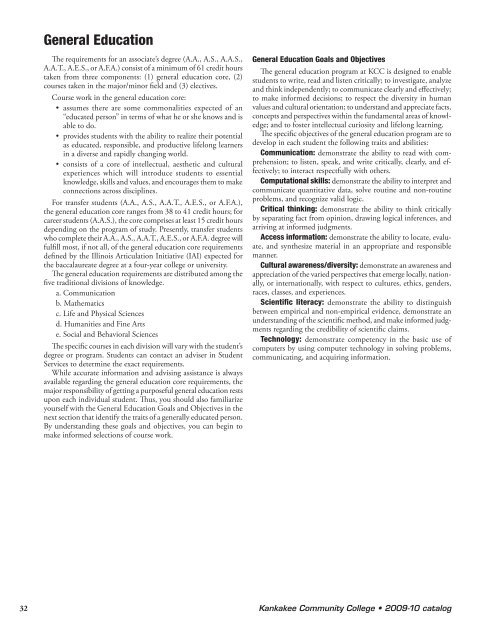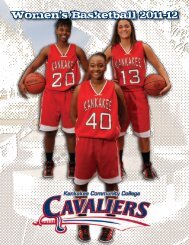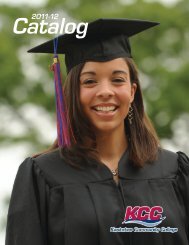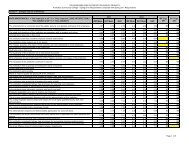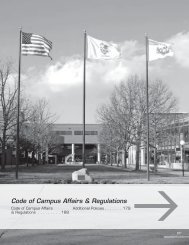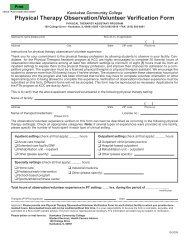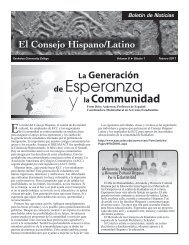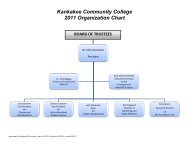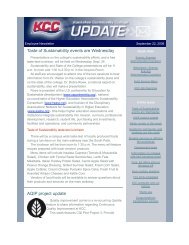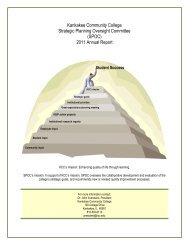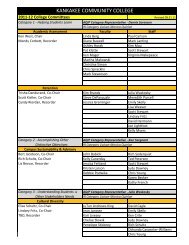09-10_Academiccatalog(Fullcatalog4.30mb) - Kankakee ...
09-10_Academiccatalog(Fullcatalog4.30mb) - Kankakee ...
09-10_Academiccatalog(Fullcatalog4.30mb) - Kankakee ...
You also want an ePaper? Increase the reach of your titles
YUMPU automatically turns print PDFs into web optimized ePapers that Google loves.
General Education<br />
The requirements for an associate’s degree (A.A., A.S., A.A.S.,<br />
A.A.T., A.E.S., or A.F.A.) consist of a minimum of 61 credit hours<br />
taken from three components: (1) general education core, (2)<br />
courses taken in the major/minor field and (3) electives.<br />
Course work in the general education core:<br />
• assumes there are some commonalities expected of an<br />
“educated person” in terms of what he or she knows and is<br />
able to do.<br />
• provides students with the ability to realize their potential<br />
as educated, responsible, and productive lifelong learners<br />
in a diverse and rapidly changing world.<br />
• consists of a core of intellectual, aesthetic and cultural<br />
experiences which will introduce students to essential<br />
knowledge, skills and values, and encourages them to make<br />
connections across disciplines.<br />
For transfer students (A.A., A.S., A.A.T., A.E.S., or A.F.A.),<br />
the general education core ranges from 38 to 41 credit hours; for<br />
career students (A.A.S.), the core comprises at least 15 credit hours<br />
depending on the program of study. Presently, transfer students<br />
who complete their A.A., A.S., A.A.T., A.E.S., or A.F.A. degree will<br />
fulfill most, if not all, of the general education core requirements<br />
defined by the Illinois Articulation Initiative (IAI) expected for<br />
the baccalaureate degree at a four-year college or university.<br />
The general education requirements are distributed among the<br />
five traditional divisions of knowledge.<br />
a. Communication<br />
b. Mathematics<br />
c. Life and Physical Sciences<br />
d. Humanities and Fine Arts<br />
e. Social and Behavioral Sciences<br />
The specific courses in each division will vary with the student’s<br />
degree or program. Students can contact an adviser in Student<br />
Services to determine the exact requirements.<br />
While accurate information and advising assistance is always<br />
available regarding the general education core requirements, the<br />
major responsibility of getting a purposeful general education rests<br />
upon each individual student. Thus, you should also familiarize<br />
yourself with the General Education Goals and Objectives in the<br />
next section that identify the traits of a generally educated person.<br />
By understanding these goals and objectives, you can begin to<br />
make informed selections of course work.<br />
General Education Goals and Objectives<br />
The general education program at KCC is designed to enable<br />
students to write, read and listen critically; to investigate, analyze<br />
and think independently; to communicate clearly and effectively;<br />
to make informed decisions; to respect the diversity in human<br />
values and cultural orientation; to understand and appreciate facts,<br />
concepts and perspectives within the fundamental areas of knowledge;<br />
and to foster intellectual curiosity and lifelong learning.<br />
The specific objectives of the general education program are to<br />
develop in each student the following traits and abilities:<br />
Communication: demonstrate the ability to read with comprehension;<br />
to listen, speak, and write critically, clearly, and effectively;<br />
to interact respectfully with others.<br />
Computational skills: demonstrate the ability to interpret and<br />
communicate quantitative data, solve routine and non-routine<br />
problems, and recognize valid logic.<br />
Critical thinking: demonstrate the ability to think critically<br />
by separating fact from opinion, drawing logical inferences, and<br />
arriving at informed judgments.<br />
Access information: demonstrate the ability to locate, evaluate,<br />
and synthesize material in an appropriate and responsible<br />
manner.<br />
Cultural awareness/diversity: demonstrate an awareness and<br />
appreciation of the varied perspectives that emerge locally, nationally,<br />
or internationally, with respect to cultures, ethics, genders,<br />
races, classes, and experiences.<br />
Scientific literacy: demonstrate the ability to distinguish<br />
between empirical and non-empirical evidence, demonstrate an<br />
understanding of the scientific method, and make informed judgments<br />
regarding the credibility of scientific claims.<br />
Technology: demonstrate competency in the basic use of<br />
computers by using computer technology in solving problems,<br />
communicating, and acquiring information.<br />
32 <strong>Kankakee</strong> Community College • 20<strong>09</strong>-<strong>10</strong> catalog


